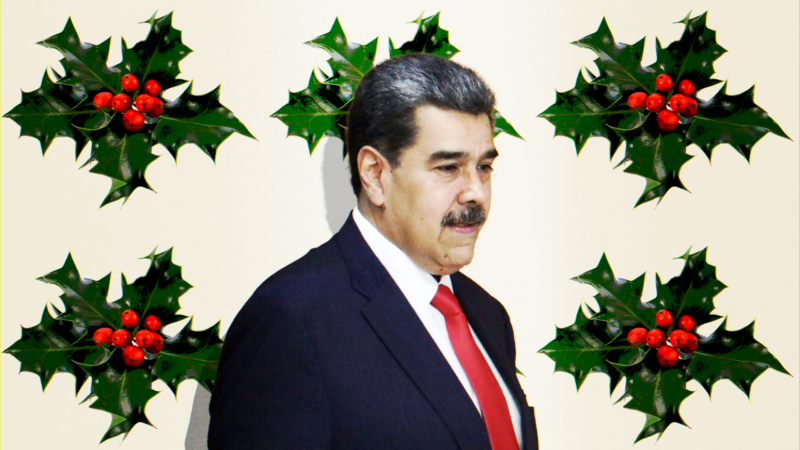Christmas in October? Maduro's Latest Ploy To Distract Venezuela
This latest stunt is nothing more than an attempted distraction from the country's deepening political and economic crises.

In a move as bizarre as it is calculated, Nicolás Maduro has officially rescheduled Christmas in Venezuela to October 1. While most of the world is waiting until December to celebrate the holiday, Maduro seems to think that an early dose of holiday spirit will magically cure his country's political turmoil.
"It is September and it already smells like Christmas," Maduro said on Monday during his television show More With Maduro. "And that is why this year, in homage to you, in gratitude to you, I am going to decree the advancement of Christmas to October 1."
While retailers like Target have been stealthily moving the Christmas season earlier and earlier to sell seasonal decor, Maduro's motives are a little less festive. He aims to distract the population from the political storm brewing around him.
Just hours before the announcement, the Venezuelan prosecutor's office ordered the arrest of Edmundo González, the opposition candidate recognized by many as the winner of July's presidential election.
Officially, Venezuela's National Electoral Council declared Maduro as the victor, with 51 percent of the vote compared to González's 44 percent. The results of the election, however, have not been made public and remain unverified by independent sources.
In response, the opposition reviewed tallies from about 80 percent of the voting machines in the country and found a very different outcome. According to their results, González swept the elections with 67 percent, leaving Maduro with just 30 percent. The United States and several Latin American and European countries have thrown their support behind González, criticizing the Maduro regime for its lack of transparency in the election process.
Following the disputed election, protests erupted across Venezuela, leaving over 20 dead and hundreds more injured. The situation has led to a massive crackdown by the regime, which has arrested over 2,000 people. Even sending a text critical of the regime can lead to charges of "terrorism."
Adding fuel to the fire, a massive blackout plunged 80 percent of the country into darkness last Friday. Maduro attributed the electrical failure to sabotage by his adversaries, but many Venezuelans see it as yet another sign of the government's failure to maintain critical infrastructure, caused by years of mismanagement and corruption.
So what does a dictator do when the country slips into chaos? He creates the perfect distraction by moving up Christmas.
In the weeks leading up to December 25, Maduro's government usually ramps up distribution of aid and food, offering a fleeting sense of relief in a country where the average minimum wage is $3.55 a month, shortages of essential goods are common, and hyperinflation is a present struggle.
This year, by moving Christmas to October, Maduro hopes to give his people something to celebrate. Promising a holiday season full of "peace, happiness, and security," the streets and public places will be decorated with Christmas spirit.
But not everyone shares his excitement. For many, this latest stunt is nothing more than an attempted distraction from the country's deepening political and economic crises.
"Christmas is supposed to be a time of joy, family reunions, parties, presents," José Ernesto Ruiz, a 57-year-old Venezuelan office worker, told the Associated Press. "[But] without money and with this political crisis, who can believe that there will be an early Christmas?"
Venezuela's Catholic leadership has condemned the move, accusing Maduro of using Christmas as a propaganda tool. The Episcopal Conference of Venezuela emphasized that Christmas is "a celebration of universal character. The manner and time of its celebration is a matter for ecclesiastical authority," not the government's.
This isn't the first time that Maduro has moved Christmas. In 2020, Maduro pushed it to October 15, hoping to distract the population from the growing humanitarian crisis worsened by the COVID-19 pandemic. A year later, he opted for October 5. Nothing says "don't look at the crumbling economy" like an early holiday season.
Moving Christmas is something that only a dictator with absolute power can pull off. But while Maduro might dream about uniting Venezuela under the twinkling lights of his forced holiday, it is more likely that people are wishing for a different kind of present this year: a country free from his grasp.


Show Comments (42)